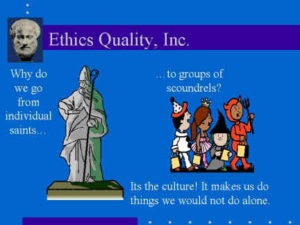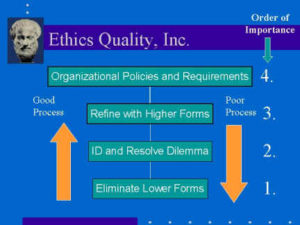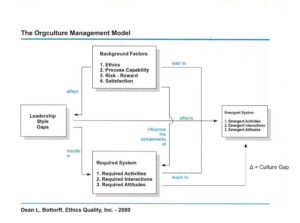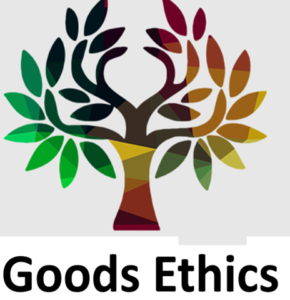Culture Management
Personal ethics and group ethics follow the same ethical principles, however they differ in their processes and effects. These differences represent the cultural effects which must be managed if organizational ethics are to improve.
Influence
Ethics in organizations are influenced more by the group ethics system (culture) than by the sum of the individual personal ethics systems. These “group effects” can have a profound effect on the ethical behavior and overall culture of an organization (see illustration below). Therefore, to improve group ethics, more emphasis is generally needed on group dynamics, or culture management, than on personal ethics systems alone. (The illustration below has been included in Wiley’s Organizational Behavior, 8th Edition, 2003, pg 265).

Ethical Reasoning Processes.
Understanding why group ethics systems tend to function at lower levels than individual ethics systems can be explained by noting the differences in the comparative reasoning processes. Individual ethics systems tend to follow the bottom up process (see illustration below) where ideas are refined in a logical progression by eliminating logical fallacies and lower forms first, followed by resolving dilemma, optimizing higher forms of ethics using moral creativity, and policy considerations. In contrast, organizational ethics systems tend to follow the top down process beginning with policies (not reasoning) and consider logical fallacies last, if at all. Organizational ethics processes tend to lack sufficient logical rigor at the beginning of the reasoning process. All decision sciences give the greatest weight to the beginning of the reasoning process, because if this step is not soundly based all subsequent steps will either be irrelevant or dead wrong. Ethical reasoning is a decision science which must obey this same principle.

Change Management Processes.
When actual behavior does not meet required or expected behavior, this deviation constitutes a “culture gap.” Whereas changes in personal ethics and behavior can often be driven by training, reasoning and awareness alone (as espoused by the classical philosophers Socrates, Plato, Aristotle), often groups create their own ethics which can differ greatly from the sum of the individual ethics systems. In order to change the behavior caused by the “group effect” commensurate changes must be “engineered” into the underlying system of causes. Studies in organizational behavior – including our ongoing OrgCulture Study – indicate that emergent behavior in groups can be heavily influenced by three forces: the Required System, Leadership Style and the Background Factors (see flow diagram below). Adding more policies (required systems), a typical knee jerk management reaction to nonconforming behavior, cannot solve a culture gap problem if the true causes are manifested in the four Background Factors, Management Styles, or combinations thereof. This kind of misdiagnosis and mismanagement not only fail to achieve their intended objective, but often make the culture gap worse than if nothing had been done at all. Culture management therefore is not only an acquired skill, but according to many management scholars, it is an essential skill that organizations need if they are to perform to their potential. Doing culture management requires that managers be trained in the tools of diagnosis and response so they may become proficient at reducing unfavorable culture gaps and improving their group’s performance.

